Unit 3 Could you please tell me where the restrooms are Section B (2a-2d)阅读课课件(共20张PPT)
文档属性
| 名称 | Unit 3 Could you please tell me where the restrooms are Section B (2a-2d)阅读课课件(共20张PPT) |
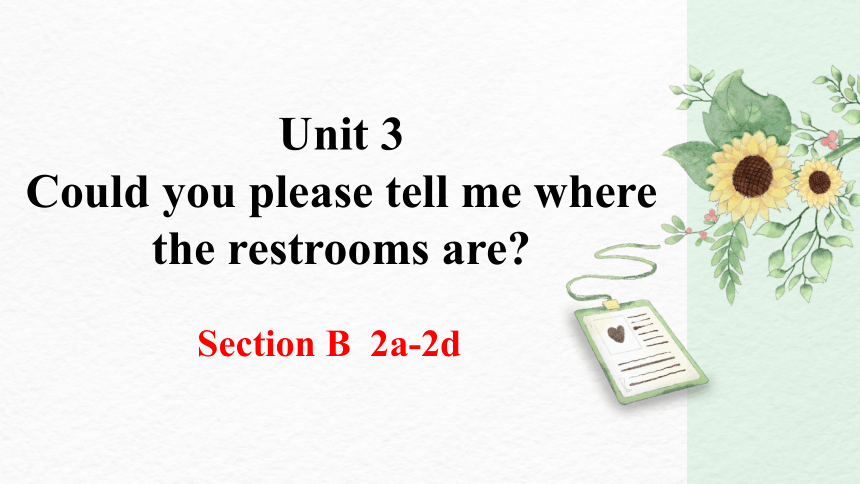
|
|
| 格式 | zip | ||
| 文件大小 | 4.4MB | ||
| 资源类型 | 教案 | ||
| 版本资源 | 人教新目标(Go for it)版 | ||
| 科目 | 英语 | ||
| 更新时间 | 2022-08-03 00:00:00 | ||
图片预览

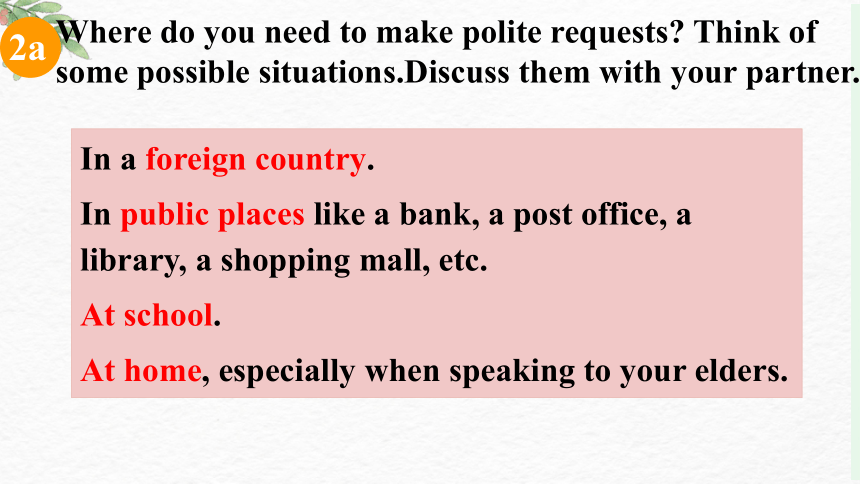
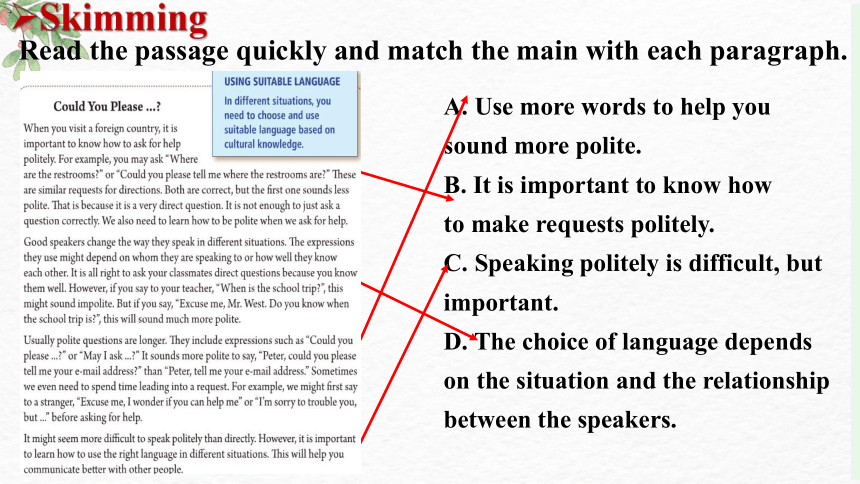
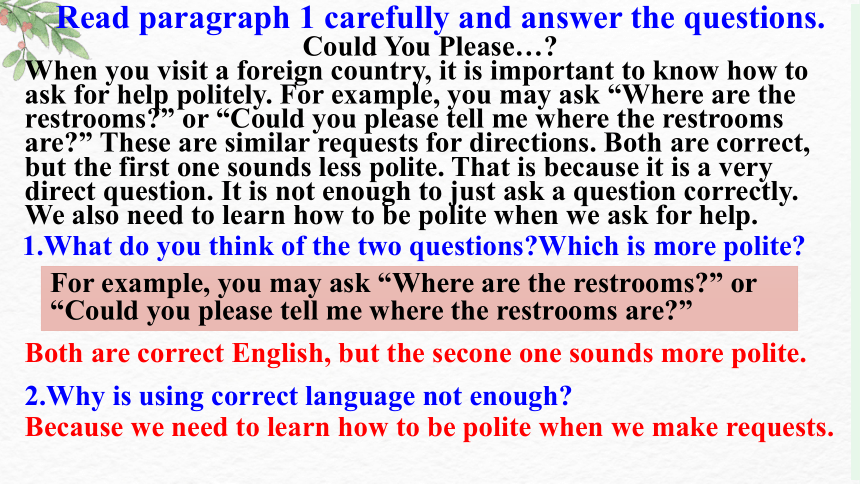
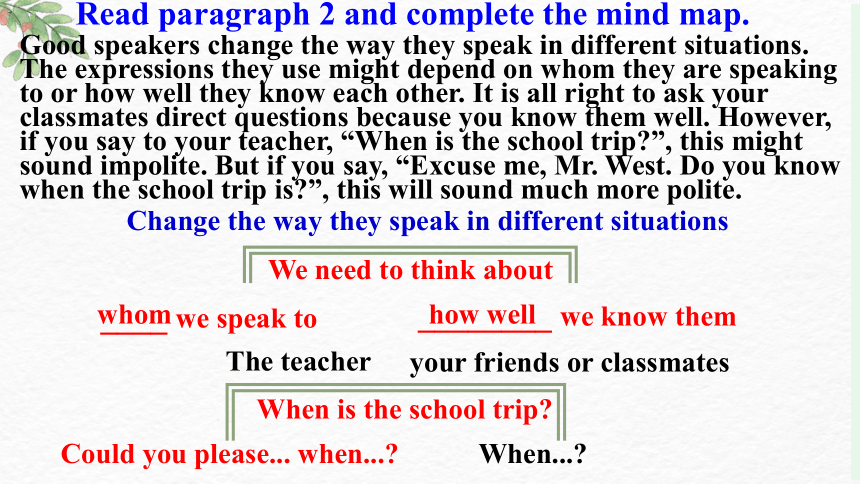
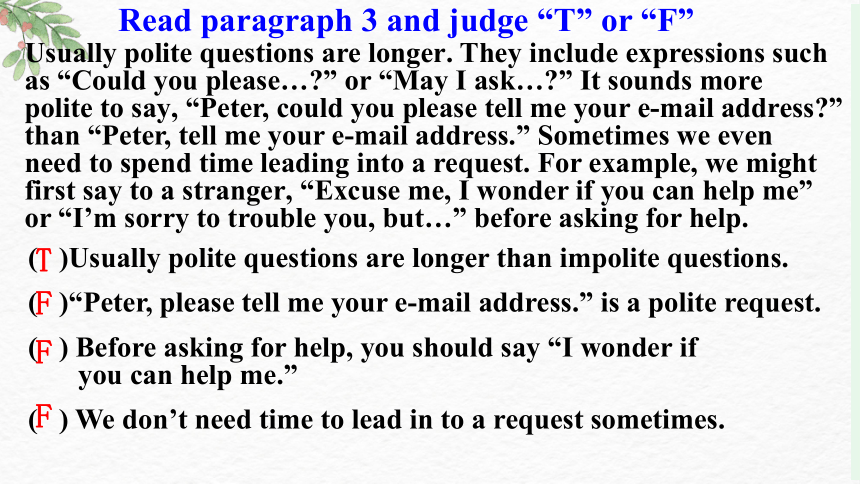
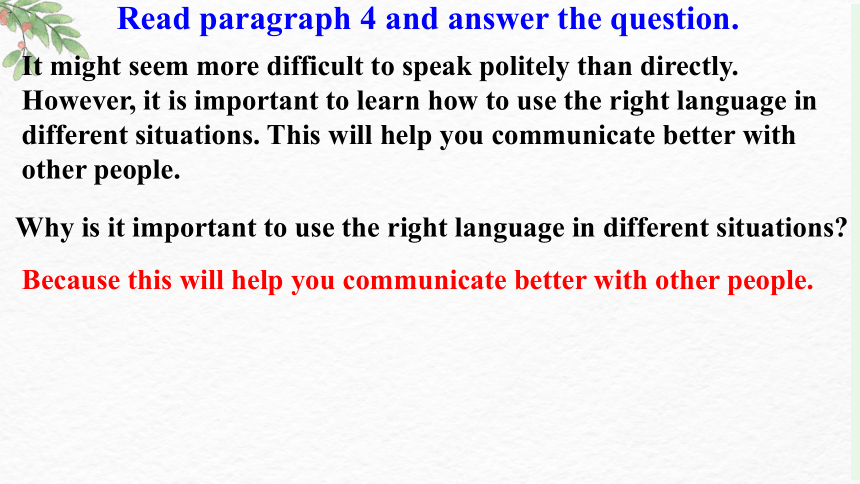
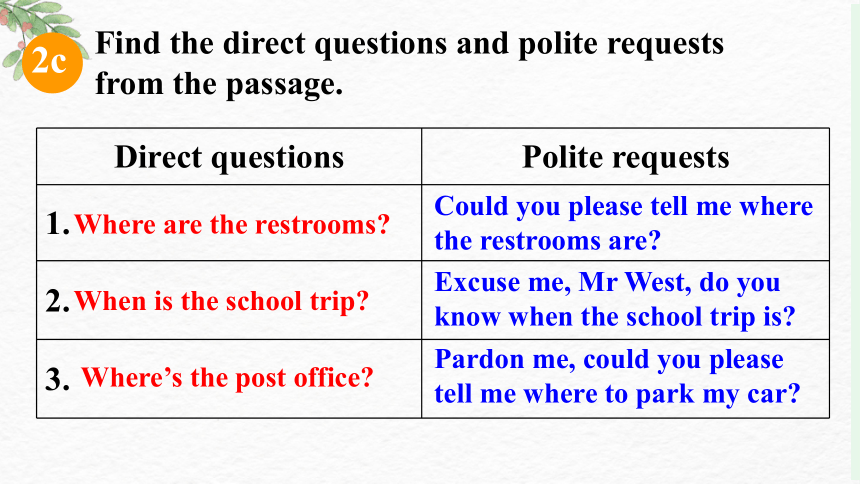
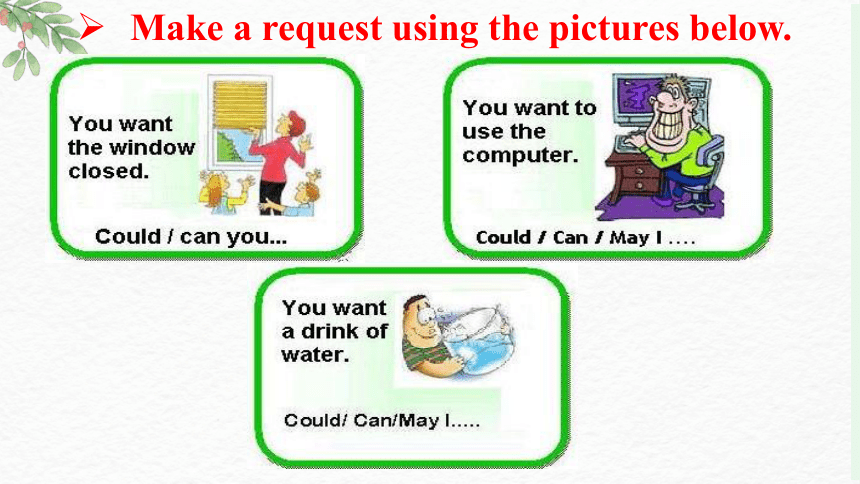
文档简介
(共20张PPT)
Unit 3
Could you please tell me where
the restrooms are
Section B 2a-2d
2a
Where do you need to make polite requests Think of some possible situations.Discuss them with your partner.
In a foreign country.
In public places like a bank, a post office, a library, a shopping mall, etc.
At school.
At home, especially when speaking to your elders.
A. Use more words to help you
sound more polite.
B. It is important to know how
to make requests politely.
C. Speaking politely is difficult, but important.
D. The choice of language depends on the situation and the relationship between the speakers.
Skimming
Read the passage quickly and match the main with each paragraph.
Read paragraph 1 carefully and answer the questions.
Could You Please…
When you visit a foreign country, it is important to know how to ask for help politely. For example, you may ask “Where are the restrooms ” or “Could you please tell me where the restrooms are ” These are similar requests for directions. Both are correct, but the first one sounds less polite. That is because it is a very direct question. It is not enough to just ask a question correctly. We also need to learn how to be polite when we ask for help.
1.What do you think of the two questions Which is more polite
Both are correct English, but the secone one sounds more polite.
2.Why is using correct language not enough
Because we need to learn how to be polite when we make requests.
For example, you may ask “Where are the restrooms ” or “Could you please tell me where the restrooms are ”
____ we speak to
Read paragraph 2 and complete the mind map.
Change the way they speak in different situations
We need to think about
________ we know them
When is the school trip
The teacher
your friends or classmates
whom
how well
Could you please... when...
When...
Good speakers change the way they speak in different situations. The expressions they use might depend on whom they are speaking to or how well they know each other. It is all right to ask your classmates direct questions because you know them well. However, if you say to your teacher, “When is the school trip ”, this might sound impolite. But if you say, “Excuse me, Mr. West. Do you know when the school trip is ”, this will sound much more polite.
Usually polite questions are longer. They include expressions such as “Could you please… ” or “May I ask… ” It sounds more polite to say, “Peter, could you please tell me your e-mail address ” than “Peter, tell me your e-mail address.” Sometimes we even need to spend time leading into a request. For example, we might first say to a stranger, “Excuse me, I wonder if you can help me” or “I’m sorry to trouble you, but…” before asking for help.
Read paragraph 3 and judge “T” or “F”
( )Usually polite questions are longer than impolite questions.
( )“Peter, please tell me your e-mail address.” is a polite request.
( ) Before asking for help, you should say “I wonder if
you can help me.”
( ) We don’t need time to lead in to a request sometimes.
T
F
F
F
It might seem more difficult to speak politely than directly. However, it is important to learn how to use the right language in different situations. This will help you communicate better with other people.
Read paragraph 4 and answer the question.
Why is it important to use the right language in different situations
Because this will help you communicate better with other people.
Find the direct questions and polite requests from the passage.
2c
Direct questions Polite requests
1.
2.
3.
Where are the restrooms
When is the school trip
Where’s the post office
Could you please tell me where the restrooms are
Excuse me, Mr West, do you know when the school trip is
Pardon me, could you please tell me where to park my car
Make a request using the pictures below.
Make a request using the pictures below.
Make a request using the pictures below.
2d
Request Person Place
1. Will you pass the salt
2.Do you know where I can change some money, please
3. Could you tell me what just happened
Read the requests below. In the second column, write A if you would say it to someone you know and B if you would say it to a stranger. In the last column, write where you think these people are.
4. Can you please tell me where the nearest station is
5. Excuse me, do you know what time it begins, please
6. Let me know when you’re ready, OK
7. Could you possibly tell me the way to the village school
Try to retell
Para. 1: ask for
help politely
Para. 2: change the way in different situations
Para. 3: usually polite questions are longer
Para. 4: how to use the right language
Where are…
Could you please…
less polite,direct
be polite
Both are right.
depend on
whom they are speaking to
how well they know each other
expressions
spend time leading into a request
Could you please…
/May I ask…
Excuse me, I wonder
if…/ I’m sorry …
speak politely
help you communicate better with other people
more difficult
more polite
How to ask politely
Group work
Post reading
BAD GOOD
Where are the corn chips
There's no milk left
How does this work
Slice it thicker / thinner.
Give me a pound of that.
Could you tell me where the corn chips are, please
Is there any more milk, (please)
Can you show me how this works (e.g. a coffee grinder)
I'd like it sliced thicker / thinner, please.
Will you give me a pound of that, please
Can / Could I have a pound of that, please
I. 单项选择。
1. The language you use depends ____ the relationship and situation.
A. in B. on C. at D. for
2. It’s important to know ____ along well with others.
A. how get B. how get to C. how to get D. to get how
3. I wonder ____ you can come to my party next Sunday.
A. if B. why C. that D. where
4. —Can you tell me ______ you bought the gift for
—Sure. It’s for my best friend, Lucy.
A. where B. when C. how D. whom
5. It sounds more ______ to say, “Could you please tell me how to get to the station ”
A. direct B. polite C. politely D. impolite
Exercises
6. — Excuse me. Could you tell me ____ — It will leave at 4:00 p.m.
A. how will you go Shanghai B. how you will go to Shanghai
C. when will the bus leave for Shanghai D. when the bus will leave for Shanghai
7. — Could you tell me _________ —You can take No. 16 bus.
A. how can we get to the Olympic Park B. how we can get to the Olympic Park
C. how did we get to the Olympic Park D. how we got to the Olympic Park
8. — I wonder _______ at 8:00 last night — I was watching NBA.
A. what were you doing B. what did you do
C. what you were doing D. what are you doing
9. I don't remember ______ the book yesterday.
A. where I put B. where did I put C. where will I put D. where l will put
10. They wonder _____ robots will make humans lose their jobs or not.
A. that B. if C. whether D. what
D
B
C
A
C
II. 根据句意及汉语提示完成单词。
1. What are your name and (地址)?
2. Joe never gave a (直接的) answer to any question of the reporters.
3. It is (礼貌) to say "thank you" when someone has helped you.
4. When the (交通) lights are red, we mustn't cross the street.
direct
address
polite
traffic
III. 完成句子。
1.知道如何礼貌地请求帮助很重要。
It's important how to for help .
2. 有时候我们甚至花时间引出一个请求。
Sometimes we even need time to a request.
3. 好的说话者会在不同的情境下改变他们的说话方式。
Good speakers change the way they speak situations.
4. 你能告诉我去村里学校的路吗?
Could you tell me ____ ____ ____ the village school
to know
ask for
politely
to spend
leading in
in different
the way to
短语
1. ask for A. 取决于; 依靠; 依赖
2. depend on B. 比如; 例如
3. pardon me C. 请求; 要求; 询问
4. such as D. 停车场; 停车区
5. parking lot E. 原谅我
Summary
Unit 3
Could you please tell me where
the restrooms are
Section B 2a-2d
2a
Where do you need to make polite requests Think of some possible situations.Discuss them with your partner.
In a foreign country.
In public places like a bank, a post office, a library, a shopping mall, etc.
At school.
At home, especially when speaking to your elders.
A. Use more words to help you
sound more polite.
B. It is important to know how
to make requests politely.
C. Speaking politely is difficult, but important.
D. The choice of language depends on the situation and the relationship between the speakers.
Skimming
Read the passage quickly and match the main with each paragraph.
Read paragraph 1 carefully and answer the questions.
Could You Please…
When you visit a foreign country, it is important to know how to ask for help politely. For example, you may ask “Where are the restrooms ” or “Could you please tell me where the restrooms are ” These are similar requests for directions. Both are correct, but the first one sounds less polite. That is because it is a very direct question. It is not enough to just ask a question correctly. We also need to learn how to be polite when we ask for help.
1.What do you think of the two questions Which is more polite
Both are correct English, but the secone one sounds more polite.
2.Why is using correct language not enough
Because we need to learn how to be polite when we make requests.
For example, you may ask “Where are the restrooms ” or “Could you please tell me where the restrooms are ”
____ we speak to
Read paragraph 2 and complete the mind map.
Change the way they speak in different situations
We need to think about
________ we know them
When is the school trip
The teacher
your friends or classmates
whom
how well
Could you please... when...
When...
Good speakers change the way they speak in different situations. The expressions they use might depend on whom they are speaking to or how well they know each other. It is all right to ask your classmates direct questions because you know them well. However, if you say to your teacher, “When is the school trip ”, this might sound impolite. But if you say, “Excuse me, Mr. West. Do you know when the school trip is ”, this will sound much more polite.
Usually polite questions are longer. They include expressions such as “Could you please… ” or “May I ask… ” It sounds more polite to say, “Peter, could you please tell me your e-mail address ” than “Peter, tell me your e-mail address.” Sometimes we even need to spend time leading into a request. For example, we might first say to a stranger, “Excuse me, I wonder if you can help me” or “I’m sorry to trouble you, but…” before asking for help.
Read paragraph 3 and judge “T” or “F”
( )Usually polite questions are longer than impolite questions.
( )“Peter, please tell me your e-mail address.” is a polite request.
( ) Before asking for help, you should say “I wonder if
you can help me.”
( ) We don’t need time to lead in to a request sometimes.
T
F
F
F
It might seem more difficult to speak politely than directly. However, it is important to learn how to use the right language in different situations. This will help you communicate better with other people.
Read paragraph 4 and answer the question.
Why is it important to use the right language in different situations
Because this will help you communicate better with other people.
Find the direct questions and polite requests from the passage.
2c
Direct questions Polite requests
1.
2.
3.
Where are the restrooms
When is the school trip
Where’s the post office
Could you please tell me where the restrooms are
Excuse me, Mr West, do you know when the school trip is
Pardon me, could you please tell me where to park my car
Make a request using the pictures below.
Make a request using the pictures below.
Make a request using the pictures below.
2d
Request Person Place
1. Will you pass the salt
2.Do you know where I can change some money, please
3. Could you tell me what just happened
Read the requests below. In the second column, write A if you would say it to someone you know and B if you would say it to a stranger. In the last column, write where you think these people are.
4. Can you please tell me where the nearest station is
5. Excuse me, do you know what time it begins, please
6. Let me know when you’re ready, OK
7. Could you possibly tell me the way to the village school
Try to retell
Para. 1: ask for
help politely
Para. 2: change the way in different situations
Para. 3: usually polite questions are longer
Para. 4: how to use the right language
Where are…
Could you please…
less polite,direct
be polite
Both are right.
depend on
whom they are speaking to
how well they know each other
expressions
spend time leading into a request
Could you please…
/May I ask…
Excuse me, I wonder
if…/ I’m sorry …
speak politely
help you communicate better with other people
more difficult
more polite
How to ask politely
Group work
Post reading
BAD GOOD
Where are the corn chips
There's no milk left
How does this work
Slice it thicker / thinner.
Give me a pound of that.
Could you tell me where the corn chips are, please
Is there any more milk, (please)
Can you show me how this works (e.g. a coffee grinder)
I'd like it sliced thicker / thinner, please.
Will you give me a pound of that, please
Can / Could I have a pound of that, please
I. 单项选择。
1. The language you use depends ____ the relationship and situation.
A. in B. on C. at D. for
2. It’s important to know ____ along well with others.
A. how get B. how get to C. how to get D. to get how
3. I wonder ____ you can come to my party next Sunday.
A. if B. why C. that D. where
4. —Can you tell me ______ you bought the gift for
—Sure. It’s for my best friend, Lucy.
A. where B. when C. how D. whom
5. It sounds more ______ to say, “Could you please tell me how to get to the station ”
A. direct B. polite C. politely D. impolite
Exercises
6. — Excuse me. Could you tell me ____ — It will leave at 4:00 p.m.
A. how will you go Shanghai B. how you will go to Shanghai
C. when will the bus leave for Shanghai D. when the bus will leave for Shanghai
7. — Could you tell me _________ —You can take No. 16 bus.
A. how can we get to the Olympic Park B. how we can get to the Olympic Park
C. how did we get to the Olympic Park D. how we got to the Olympic Park
8. — I wonder _______ at 8:00 last night — I was watching NBA.
A. what were you doing B. what did you do
C. what you were doing D. what are you doing
9. I don't remember ______ the book yesterday.
A. where I put B. where did I put C. where will I put D. where l will put
10. They wonder _____ robots will make humans lose their jobs or not.
A. that B. if C. whether D. what
D
B
C
A
C
II. 根据句意及汉语提示完成单词。
1. What are your name and (地址)?
2. Joe never gave a (直接的) answer to any question of the reporters.
3. It is (礼貌) to say "thank you" when someone has helped you.
4. When the (交通) lights are red, we mustn't cross the street.
direct
address
polite
traffic
III. 完成句子。
1.知道如何礼貌地请求帮助很重要。
It's important how to for help .
2. 有时候我们甚至花时间引出一个请求。
Sometimes we even need time to a request.
3. 好的说话者会在不同的情境下改变他们的说话方式。
Good speakers change the way they speak situations.
4. 你能告诉我去村里学校的路吗?
Could you tell me ____ ____ ____ the village school
to know
ask for
politely
to spend
leading in
in different
the way to
短语
1. ask for A. 取决于; 依靠; 依赖
2. depend on B. 比如; 例如
3. pardon me C. 请求; 要求; 询问
4. such as D. 停车场; 停车区
5. parking lot E. 原谅我
Summary
同课章节目录
- Unit 1 How can we become good learners.
- Section A
- Section B
- Unit 2 I think that mooncakes are delicious!
- Section A
- Section B
- Unit 3 Could you please tell me where the restroom
- Section A
- Section B
- Unit 4 I used to be afraid of the dark.
- Section A
- Section B
- Unit 5 What are the shirts made of?
- Section A
- Section B
- Review of Units 1-5
- Unit 6 When was it invented?
- Section A
- Section B
- Unit 7 Teenagers should be allowed to choose their
- Section A
- Section B
- Unit 8 It must belong to Carla.
- Section A
- Section B
- Unit 9 I like music that I can dance to.
- Section A
- Section B
- Unit 10 You're supposed to shake hands.
- Section A
- Section B
- Review of Units 6-10
- Unit 11 Sad movies make me cry.
- Section A
- Section B
- Unit 12 Life is full of the unexpected
- Section A
- Section B
- Unit 13 We're trying to save the earth!
- Section A
- Section B
- Unit 14 I remember meeting all of you in Grade 7.
- Section A
- Section B
- Review of Units 11-14
